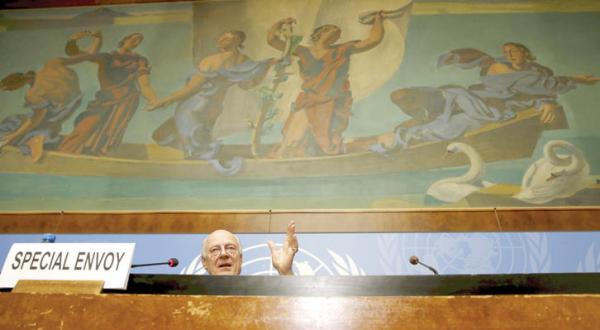Paris-Western Diplomatic sources, who are up to date with all contacts in Geneva and to the movements performed by the U.N. Special Envoy to Syria Staffan De Mistura, said that the latter in on his way to lose any margin for the political and diplomatic movements, especially with the intensification of battles in Aleppo and the almost total collapse of the truce, which makes any thought about returning to talks in Geneva absolutely illogical.
The sources Asharq Al-Awsat contacted added on Thursday that De Mistura’s mission is now depend on how the Russian President will help him to curb the Syrian regime’s military schemes that are supported by Russia.
Sources added that De Mistura was correct when he expressed his willingness to visit Moscow next week because the “key of peace and war in Syria is now to be decided by Putin.”
Regarding the U.S. role and what Washington can do to put pressure on Russia and bring back the truce in Syria, the sources were skeptical of the U.S. ability or desire to affect the Russian party as long as Washington is determined to fight ISIS and sees no other way to solve the Syrian crisis but in Geneva talks.
In addition to that, Moscow has not sent any sign of confirmation to respond to De Mistura’s request to convene an emergency ministerial meeting of major and regional powers who compose the International Syria Support Group, which is co-chaired by Washington and Russia, in order to save this truce; not to mention the direct work with the White House to put pressure on active parties and solve this issue.
In a common matter, De Mistura voiced deep concern at the truce unraveling in Aleppo and at least three other hotspots, although he saw some narrowing of positions between the government and opposition visions of political transition.
“Hence my appeal for a U.S.-Russian urgent initiative at the highest level, because the legacy of both President Obama and President Putin is linked to the success of what has been a unique initiative which started very well. It needs to end very well,” de Mistura told a news conference.
“There is no reason that both of them which have been putting so much political capital in that success story and have a common interest in not seeing Syria ending up in another cycle of war should not be able to revitalize what they have created and which is still alive but barely.”
